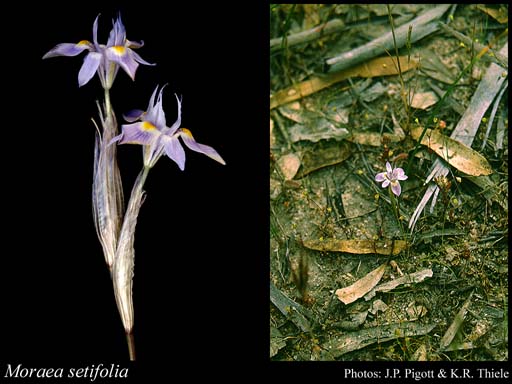- Reference
- Rep.Bot.Exch.Club Brit.Isles 4:363 (1916)
- Conservation Code
- Not threatened
- Naturalised Status
- Alien to Western Australia
- Name Status
- Current
Cormous, perennial, herb, to 0.35 m high. Fl. purple-blue-yellow, Sep to Nov. Brown sandy loam or clay, red, white and black clayey soils, gritty sand granite. Seasonal creeklines and wetlands, near salt lakes, hills, valley slopes, paddocks.

Distribution
- IBRA Regions
- Avon Wheatbelt, Coolgardie, Esperance Plains, Geraldton Sandplains, Jarrah Forest, Mallee, Swan Coastal Plain.
- IBRA Subregions
- Fitzgerald, Geraldton Hills, Katanning, Lesueur Sandplain, Merredin, Perth, Southern Cross, Southern Jarrah Forest, Western Mallee.
- IMCRA Regions
- Central West Coast.
- Local Government Areas (LGAs)
- Albany, Beverley, Boyup Brook, Busselton, Carnamah, Cunderdin, Dowerin, Dumbleyung, Gnowangerup, Gosnells, Jerramungup, Kellerberrin, Kulin, Lake Grace, Merredin, Mingenew, Moora, Morawa, Murray, Narrogin, Northam, Northampton, Pingelly, Plantagenet, Quairading, Ravensthorpe, South Perth, Subiaco, Victoria Plains, Wagin, Wongan-Ballidu, Yilgarn.
Management Notes (for the Swan NRM Region)
General Biology. Growth form. Geophyte. Life form. Annually renewed corm. Reproduction. Primarily seed, occasionally offsets. Dispersal. Water, soil. Time to first flowering. 3 years. Fire response. Generally survives fire.
Additional information. Origin. Southern Africa. History of use/introduction. Garden escape.
Suggested method of management and control. Spot spray metsulfuron methyl 0.2 g/15 L or chlorsulfuron 0.2 g/15 L + Pulse® or 2.5-5 g/ha + Pulse® or 2,2 DPA 55 g/10 L + Pulse®. Apply just on flowering at corm exhaustion. Read the manufacturers' labels and material safety data sheets before using herbicides. For further information consult the Australian Pesticides and Veterinary Medicines Authority to determine the status of permits for your situation or state.
Management Calendar
| Calendar Type | Jan | Feb | Mar | Apr | May | Jun | Jul | Aug | Sep | Oct | Nov | Dec | Comments |
|---|---|---|---|---|---|---|---|---|---|---|---|---|---|
| Dormant | Y | Y | Y | ||||||||||
| Active Growth | Y | Y | Y | Y | Y | Y | Y | Y | Y | ||||
| Flowering | Y | Y | Y | ||||||||||
| Fruiting | Y | Y | Y | ||||||||||
| Optimum Treatment | Y | Y |
Legend: Y = Yes, regularly, O = Occasionally, U = Uncertain, referred by others but not confirmed.
References
- Brown, K. & Brooks, K. (2002) Bushland Weeds: A Practical Guide to their Management. Environmental Weeds Action Network, Greenwood.
- Brown, K. & Paczkowska, G. (2006) Managing weeds in bushland: Cape Tulip (Moraea flaccida & M. miniata). Department of Environment and Conservation Brochure.
- Du Plessis, N. & Duncan G. (1989) Bulbous plants of Southern Africa. Tafelberg Publishers Ltd, Cape Town, South Africa.
- Goldblatt, P. (1986) The Moraeas of Southern Africa. A systematic monograph of the genus in South Africa, Lesotho, Swaziland, Transkei, Botswana, Namibia and Zimbabwe. Annals of Kirstenbosch Botanic Gardens, 14.
- Hussey, B.M.J., Keighery, G.J., Dodd, J., Lloyd, S.G. & Cousens, R.D. (2007) Western Weeds. A guide to the weeds of Western Australia. 2nd Edition. The Plant Protection Society of Western Australia, Victoria Park.